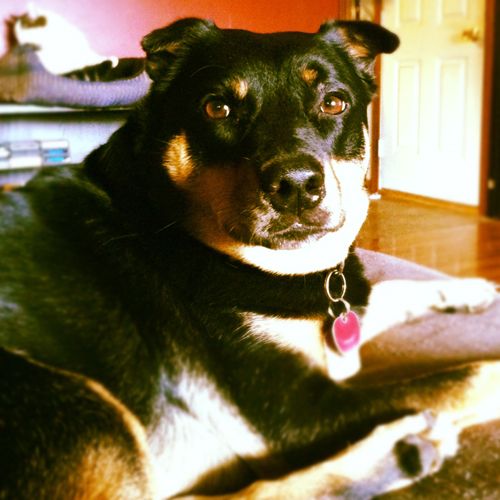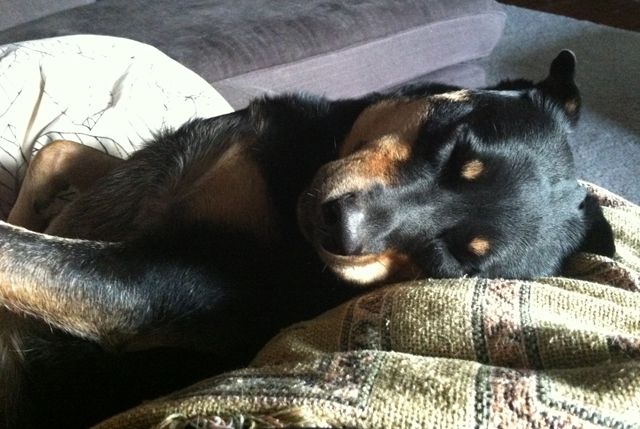October 1st is National Black Dog Day, a day designated to raise "public awareness about these beautiful, shiny fur babies that offer just as much unconditional love as any other dog and deserve just as much love back."

Zelda
Zelly is a BBD. A big black dog.
Black dogs who find themselves in shelters often have trouble finding their way out again. It's a prejudice that affects black dogs of all sizes, although it is the bigger black dogs who tend to have the roughest go of it. It's a phenomenon known as Big Black Dog Syndrome, or Big Black Dog Bias. BBDs tend to spend longer in shelters/rescues, and spending longer in overburdened shelters means a higher risk of death, in places without funding or facilities to support long-term care of huge numbers of homeless dogs.
There are a lot of factors that play into BBD Syndrome: People still choose dogs primarily on appearance, despite the fact that temperament and energy is what determines the success of an adoption. The color black also continues to be used as a cultural marker of ethical darkness, and the association is so deeply ingrained that studies have found people to judge teams wearing black uniforms as more aggressive even when they are not, and found people to be more aggressive when wearing black uniforms than other colors. Black dogs are routinely portrayed as aggressive in pop media. Black dogs don't photograph as well (or, really, as easily) as lighter- or multicolored dogs, which puts them at a disadvantage on pet adoption sites.
And black coats have the most marked difference between healthy and neglected dogs: Zelda is constantly complimented on her lush, shiny coat, but when we first saw her, emaciated and malnourished and dirty, her coat was flat and lackluster; it had a grim, greyish cast but was dark enough to show all the dander cast off from her dehydrated skin.
It all conspires to make life difficult for a homeless BBD.
When Tamara Delaney of Woodville, Wis., volunteered to find a home for a black Labrador Retriever named Jake last year, she had no idea what she was up against. Jake, cared for by a rescue group, had already waited nearly three years for a new home. And he would wait eight more months as Delaney tried to find someone to take in the big Lab.Doomed. It is, unfortunately, an appropriately ominous word.
It didn't matter much that Jake was a sociable dog and in perfect health. Jake's problem wasn't his temperament—it was the color of his coat. Jake bore the stigma of the "BBD," an acronym used to refer to big black dogs, who are frequently passed over for flashier, prettier dogs and wind up, like Jake, waiting for years to be adopted.
"Nobody wants a black-coated dog," rescue workers told Delaney as she tried without success to find a home for Jake. And when Delaney turned to the Internet, she found that shelters across the country were overflowing with black-coated mutts.
"Please don't overlook our black dogs," rescue groups pleaded on their home pages above pictures of Rottweilers, Chows and Labs sporting bright bandanas. One shelter's website just came right out with the grim truth: "The general public is not aware of how doomed black dogs are when they are brought to a pound."
Jake escaped that fate. Delaney adopted him. And then, in 2004, she started Black Pearl Dogs, to help save more black dogs and raise awareness about the bias against them—a problem that yet persists.
Most black dogs have to rely on shelter staff and volunteers to steer potential adoptors their way. And indeed, many shelters take extra steps to make black dogs more adoptable, according to Kate Pullen, director of animal sheltering issues at the Humane Society of the United States in Washington, D.C. Teaching the dogs tricks, putting placards on kennels highlighting the dog's personality ("I may just be a black dog, but I know how to balance a biscuit on my nose."), making sure multiple black dogs aren't kenneled next to one other—anything to catch the eye and imagination of potential adoptors.Iain and I have often recalled how the shelter staff knew nothing about Zelda—a stray BBD who hadn't even been given a name. They didn't know if she was housebroken or spayed. They barely even knew what dog we were talking about when we said we wanted to adopt her. It's not that they were heartless; they were overwhelmed, and they quite justifiably assumed no one was going to give the BBD with the silly ears a home.
"I've had to turn away many black dogs because I can't fill the place up with them," says Jill Wimmer, shelter manager at PAWS Atlanta, that city's oldest and largest no-kill shelter. "And every one I turned away had a great temperament." Wimmer knows that she can likely adopt out three dogs in the time it takes to find a home for one BBD.
Black dogs need extra effort to find homes, but limited time and resources means that extra effort always comes at the expense of other dogs, who are more adoptable.
The best thing I can think to do is help raise awareness about the plight of black dogs, so that they don't require extra effort in the first place.
After all, even if they could advocate for themselves, it's still us who needs to change.

My black dog Zelda, fast asleep on my lap.
* * *
Note: Black cats also face a similar problem, with the added complication of superstitions about black cats being bad luck. Black cats fortunately have lots of champions working to undermine that bias. I have owned three solid black cats in my life: Midnight, Inky, and Moire. None of them brought me any bad luck. ♥




Shakesville is run as a safe space. First-time commenters: Please read Shakesville's Commenting Policy and Feminism 101 Section before commenting. We also do lots of in-thread moderation, so we ask that everyone read the entirety of any thread before commenting, to ensure compliance with any in-thread moderation. Thank you.
blog comments powered by Disqus